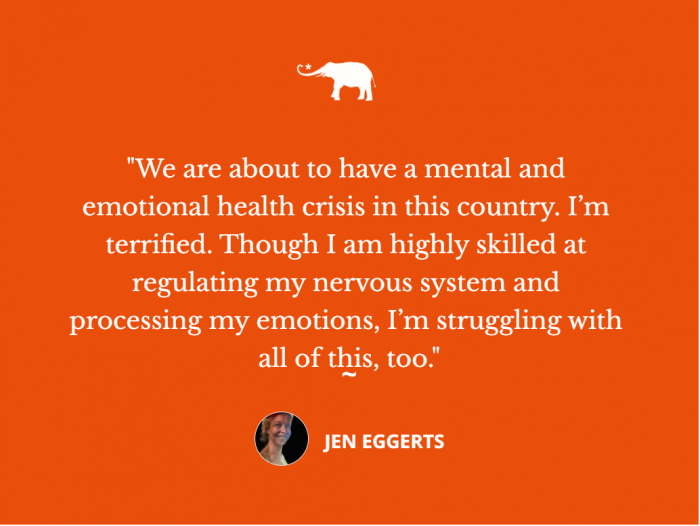View this post on Instagram
It’s getting harder and harder to miss. People mindlessly walking the aisles of grocery stores, erratically driving, reporting memory loss, and just being “out of it.”
Between COVID-19, quarantine, political upheaval, and economic floundering, we are all living in a state of prolonged and complex stress.
We are a nation that is dissociated.
Dissociation describes a mental process where a person disconnects from their thoughts, feelings, memories, or sense of identity. While it happens to all of us at different times and it is part of normal brain functioning, too much of it is concerning.
One, walking around dissociated isn’t particularly safe. Two, the underlying reasons for the dissociation need to be addressed. If the emotions are not processed in a timely manner, the psyche starts burying them. This leads to all sorts of consequences like rage, anxiety, depression, addiction, as well as physical and mental illness.
Dissociation can also manifest as mindlessness. Simple everyday tasks get a little blurry. For me, this often looks like forgetting where I left my keys, putting a meeting on my calendar for the wrong day, and forgetting some of the details of a conversation I had with a friend.
The reason for this isn’t overly complicated. Because there is much more stress and uncertainty every day, much of our energy is now being dedicated to basic functioning. When before basic activities took say 30 percent of our daily output energy, they are now well above 50 percent. That means that we consistently have less activated energy available to us on a daily basis. We also aren’t getting enough meaningful breaks to replenish.
For example, going to a grocery store (something that used to be just another chore) can now be a full-tilt anxiety-attack-provoking event. In addition to all the precautions we now must all take, we are also more isolated from each other and have shorter fuses.
So, here we are, trying to live in something that we hope is temporary, but have no idea when it will stop. This is prolonged complex stress. It breeds reactivity too. The longer the quarantine goes on, the more restless we all become. Depending upon your living situation, you may spend most of your time alone. Staying home is hard. For some, the restlessness has been much more difficult and it has led to incredible amounts of recklessness in arenas of expression.
With less face-to-face time and more social media interaction, boundaries are valued less. As people get more stressed and are unable to process their emotions, the anger gets directed in safer outlets. Yelling at someone on social media is better than yelling at your kid, right?
Yes, and no.
Causing direct harm to someone in your inner circle is highly unfortunate. Hateful comments on social media are less likely to sever relationships—especially when you don’t know the person well. It’s still harmful, however, and so long as frustration is being thrown in irresponsible ways, harm will be perpetuated. The problem is, if we are not regularly processing our emotions, we lose the ability to respond accountably. Deflection, projection, and blame turn into harm quickly.
Believe it or not, this is another type of dissociation. Picking fights, childish behaviors, and rage are all ways that we can “dis-associate” ourselves from our core emotions. So, while some of us turn inward, others turn outward. Our methods of creating space between ourselves and our painful emotions vary as much as we do. Between our individual biologies, life experiences, and access to resources, we all shut down in different ways.
Dissociation isn’t anything new. Trauma isn’t anything new. Adverse life experiences aren’t anything new. What’s new is that every person in this country (and certain countries abroad) is experiencing a collective level of trauma on a daily basis. We are all affected, period. There aren’t breaks in the action. It’s constant, and it’s all of us.
I do want to add that this situation is exacerbated for people of color—those living at or below the poverty line, those with physical and mental illness, the neurodivergent, and the elderly. While this has affected all of us, it has not affected all of us equally, nor have resources been provided to those in need equitably.
To say that this is going to be a massive issue in the coming few years is an understatement. We are about to have a mental and emotional health crisis in this country. I’m terrified. Though I am highly skilled at regulating my nervous system and processing my emotions, I’m struggling with all of this, too.
My hope is that by talking about this now, we can begin to talk about ways to manage and support our population as we heal from this intense period in history.











Read 1 comment and reply